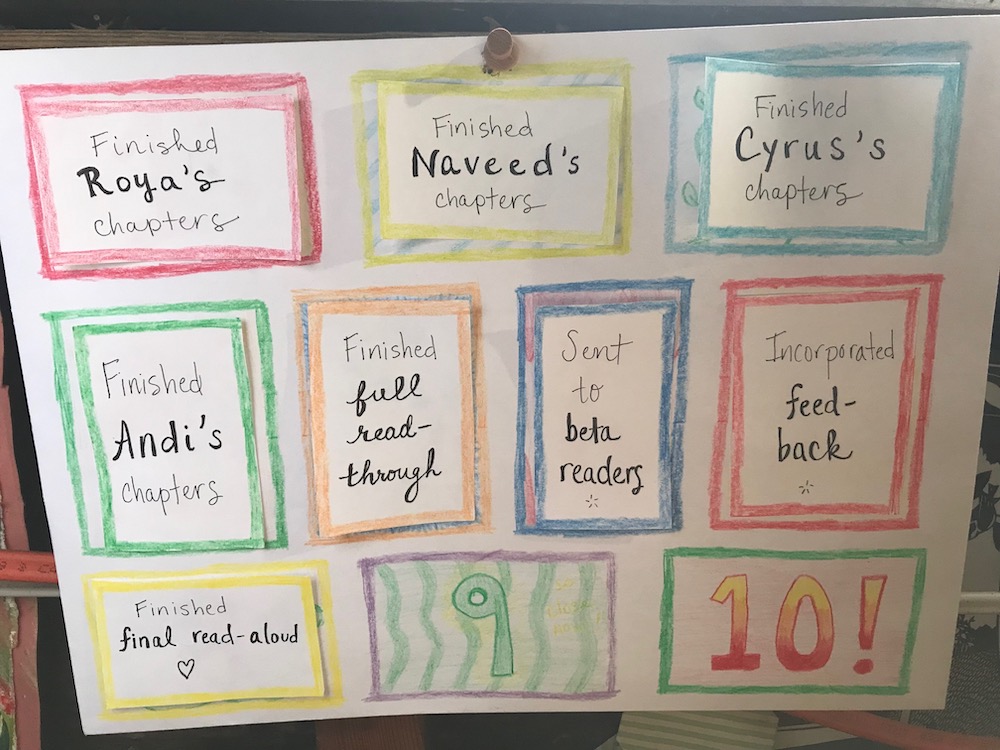Writing a book is hard. And it takes a ton of time. As I wrap up work on What We Bury, the last book of the Call of the Crow Quartet, I thought I’d share a few of the things that helped me manage this massive project in the midst of global turmoil and an ongoing pandemic.

#1: Work on your project every day (if you can)
When I’m about to dive into a new project, I always feel overwhelmed by the sheer amount of work ahead of me. This can be absolutely paralyzing! And the stakes felt higher to me this time – since this is the final book of the series, I REALLY wanted to do it justice, but it had been a while since I worked on a manuscript and I worried that I wouldn’t be able to find my flow again.
But, having been through this a time or two before, I knew that dwelling in this place too long would just make it harder to break free from the land of frustration and unfulfilled dreams. So I made a commitment to working on it a little bit each day. Some authors opt for hitting a certain word count, but that doesn’t usually work for me since the bulk of my writing work is spent in the revision phase. Instead, I tried to spend at least a half hour of focused time on it every day for a month.
That may not sound like much, but the important thing was to let the story come alive in me again, and that could only be done by showing up for it consistently. In the beginning, I used the Forest app so that a virtual tree would grow while I put my time in, and that helped motivate me to keep my initial streak up, but I soon found that I needed it less and less. I haven’t opened it in months now – but the book got done anyway, because I was able to find my way back into that flow state and the progress began feeding on itself in a virtuous cycle.
#2: Take a break from time-sucks
I’ve started to feel way less guilty about taking time away from social media when I’m working on book-writing. For me, the time-suck isn’t just due to scrolling for too long; residual effects last for hours after I close the app. Personal updates and distressing news and comment section back-and-forths remain lodged in my head all day, sucking my attention away from the places I want it (and need it) to be. Writing a book requires an intense level of focus that has only become harder to maintain in pandemic times. When I’m in the thick of it, I cut back on blogging, sign off social media for months at a time, spend about 15 minutes reading news headlines in the morning, catch up on emails, then turn off all my notifications so I can concentrate.
That said, I don’t go off grid entirely. I’m still working, volunteering, signing petitions, skating, hanging out with my family, puttering around in the garden, and chatting with friends. It’s just that I’m extra intentional about how I spend my time, attention, and energy.
#3: Create your own cutting room floor
The first draft of What We Bury weighed in at a whopping 125,000 words (about 500 pages)! So I knew I’d have to cut it significantly to get it more in line with the ~350 page length of the other books. I followed some advice I’d found on writing blogs and created a separate document I called What We Bury in the Dump. This was my cutting room floor – the place where all the deleted scenes, chapters, and sentences ended up. Even though I keep many versions of my works in progress so I can always go back to an earlier draft if I have second thoughts about getting rid of something, it somehow felt better to cut them out and paste them to another document instead of hitting the delete key. That just feels so permanent!
My “dump” document turned into an extraordinarily messy thing, because I also used it to keep track of revision notes and to freewrite about plot dilemmas I was facing. I sure hope I’ll never have to look at it again! But I am very grateful for the role it played in the process. Because, bit by bit, word by word, the final manuscript dropped down to a much more manageable 106,000 words, and is much tighter and better-paced as a result.
#4: Reward yourself when milestones are reached
This is by far my favorite tip of the bunch! Before I dove into this revision, back when I was feeling totally overwhelmed, I came up with an overall game plan. Sometimes I’ll go through chapter-by-chapter in order, but this book called for a character-by-character rewrite. So I broke the project into more manageable chunks and came up with ten big milestones that I would reach along the journey.
But I didn’t stop there! Following yet more writing blog advice, I found little presents to reward myself at every step of the way. Nothing too fancy – bath bombs, a bag of Hippeas all to myself, a new pair of sunglasses, chocolate-covered marzipan, etc. Still, they were things I usually wouldn’t indulge in, so they felt special to me. I rounded them out with a few cards describing the more experiential rewards (go for a nature walk! plant something new!), and then I wrapped everything up and displayed it by my writing desk.
Every time I reached one of my milestones, I unwrapped my present and added the milestone to a progress poster I made.

My only regret is making myself wait so long for that marzipan chocolate! I didn’t “earn” that one until mile(stone) 7. But I’ve enjoyed receiving tangible rewards, and encouraging notes from my past self, as I’ve progressed through the project.
Your Thoughts
Do you have any tips of your own for tackling big projects, writing-related or otherwise? Leave them in the comments below!



Pingback: Producing an Audiobook as an Indie Author: 4 Lessons Learned - Alanna Peterson